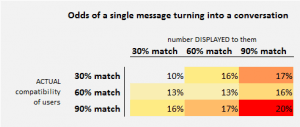Back in June, it seemed like the whole of the internet had taken to their keyboards to write furious responses to the Facebook mood manipulation story. The reaction to the study was so profound, that Senator Mark Warner asked the FTC to intervene and investigate. Now, only a few weeks later, the furore has all but vanished. People have continued to use the social media website in their billions, all but forgetting they were once distressed by how little they know what goes on behind the scenes.
But compared to OkCupid’s recent announcement, Facebook’s study looks like child’s play. Facebook tweaked their algorithm to alter people’s news feeds and moods. OkCupid scrapped their algorithm and decided to tell incompatible people they were perfect matches, just to see what would happen. Their justification? According to Christian Rudder, author of the blog post “If you use the Internet, you’re the subject of hundreds of experiments at any given time, on every site. That’s how websites work.”
OkCupid’s Experiment: The Findings
On a recent blog post, OkCupid outlined three experiments it had performed on its users. The first two seem harmless enough. The first revolves around “Love is Blind Day”, a day where OkCupid removed all of the profile pictures from its website to celebrate the release of their short-lived blind dating app. The results were heartening. During the image blackout:
However, once the images reactivated, the 2,200 “blind” conversations ground to a halt- “It was like we’d turned on the bright lights at the bar at midnight”, Rudder states. They also found a similar correlation between offline reaction to blind dates and online reaction to profiles with images- going in blind led to much higher levels of satisfaction with the match. Rudder concludes “people are exactly as shallow as their technology allows them to be.”
The second experiment focused on rating the “looks” and “personality”, a service OkCupid openly used to offer on the site. They found a strong correlation to being found good looking, and being deemed to have a good personality. The young woman below was found to have a 99th percentile personality, despite having no text or personal information on her OkCupid page. The mind boggles as to why that might be.
They ultimately conclude having text on your OkCupid page has scarcely any affect on how you’re rated. Lesson? The good people of OkCupid are shallow, shallow creatures.
So far so good, but then we reach experiment number three. Whereas the previous two experiments focused around gathering data on the ways in which people organically interact with the day-to-day basis, experiment three actively meddled with the basic format of the website, to set up people who would be, according to OkCupid’s algorithm, utterly disastrous together.
The experiment came about because the OkCupid team idly wondered if their algorithm only worked because “people just like each other because they think they’re supposed to? Like how Jay-Z still sells albums?” They then decided to tamper with people’s compatibility scores, telling people who were terrible for each other (30% matches) that they might be soulmates (90% matches). The results show that, being told you’re a good match and actually being a good match is the optimal scenario:
But what about those 17% of users who were terrible matches, told they were great matches, and struck up conversations? At best, OkCupid wasted their time. At worst, OkCupid formed relationships which they knew were fundamentally flawed. Obviously, the OkCupid algorithm isn’t the be-all-and-end-all when it comes to compatibility, but OkCupid users trust that the service is suggesting people they might actually have a connection with.
User Experimentation: Where Do You Draw the Line?
The internet was up in arms about Facebook’s mood manipulation study. Yet, that study affected people’s moods briefly during a singular internet experience. As Rudder himself notes, “On OkCupid, when we make a change, even a mundane one, that changes who people talk to, who they flirt with, who they go on dates with, and I’m sure in some cases who they get married to.” There might be couples out there now whose love life and emotions have been heavily impacted by a study, just to see what would happen when you set up incompatible people. On an individual level, the ramifications are huge.
There is also the question of exactly why OkCupid decided to run these experiments. The blog vindicates their actions:
I’m the first to admit it: we might be popular, we might create a lot of great relationships, we might blah blah blah. But OkCupid doesn’t really know what it’s doing. Neither does any other website. It’s not like people have been building these things for very long, or you can go look up a blueprint or something. Most ideas are bad. Even good ideas could be better. Experiments are how you sort all this out.
A data-driven approach, fuelled by experimentation and analysing the results, is indeed a valid one. But there’s a profound difference between A/B testing to see which shade of blue makes people click on links, and using your power in deciding who connects with whom to purposefully set up incompatible people.
The question still remains: what exactly did OkCupid gain from this experiment? They claim it offers validation that their algorithm works- but there are much more nuanced ways of fine-tuning an algorithm than scrapping it altogether and seeing what happens when you forge fundamentally incompatible partnerships.
Christian Rudder also includes a plug for his new book at the end of the blog post. Given the amount of media attention this story is garnering, publicity is not a motivation which can be discredited. One thing they haven’t lost so far is users- according to the comments section, OkCupid deliberately pulled forward the renewal date for premium “A-list” subscriptions, so customers paid up before the blog post was released.
Moving Forward: Data Transparency
Ultimately, greater data transparency is a good thing. Although many- if not most- people have taken issue with the experiments conducted by Facebook and OkCupid, at least we now know they’re going on. Opacity in how our data is being used and how user experience is being knowingly manipulated has become endemic. And just because “everybody is doing it” (to paraphrase OkCupid’s defence), it doesn’t mean that data transparency will always be an unachievable goal.
What these companies are doing is perfectly legal: data transparency is not currently a requirement by law. No legal precedent has been set largely because we’ve never encountered a time in human history before who so much personal data has been made available to companies. We find ourselves in a new era of the information economy, with no checks and balances in place to ensure our personal data isn’t being misused.
Reactionary stunts such as Senator Mark Warner asking the FTC to investigate Facebook might not get us very far. But greater awareness in public consciousness about the ways our information is being collected, stored and distributed is the first step to implementing incremental (if not national change). Both the White House and the FTC released papers earlier this year calling for greater data transparency- so far, no change. But the city of San Francisco, the birthplace of the big data revolution, is planning to implement a “process for accessing your individual data” within the next few years. The more awareness is raised, the more likely we are to see initiatives like this take root.
Ultimately, OkCupid’s actions have made alot of people very uncomfortable. But at least we now have greater knowledge on how our data is being used and manipulated, and more of an impetus to stop it happening again in the future.
(Image credit: OkCupid blog)
Eileen McNulty-Holmes – Editor
Eileen has five years’ experience in journalism and editing for a range of online publications. She has a degree in English Literature from the University of Exeter, and is particularly interested in big data’s application in humanities. She is a native of Shropshire, United Kingdom.
Email: [email protected]
Interested in more content like this? Sign up to our newsletter, and you wont miss a thing!
[mc4wp_form]











